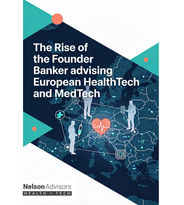The firms on a mission to drag the slumbering NHS into a Digital age
- Jack Torrance
- Dec 2, 2017
- 3 min read

Squeezed budgets, political opposition and complex bureaucracy have made it difficult to bring the NHS into the digital age. But the life sciences industrial strategy report published on Monday called for a “new philosophy of collaboration and trust”between the health industry’s public and private sectors to speed up adoption of innovative technologies and make the system more efficient. Technology companies are already transforming the health service, making it simpler for patients to book appointments and order prescriptions and allowing doctors to monitor their patients’ health and diagnose conditions more effectively.
Why is the NHS under so much pressure?
An ageing population. There are one million more people over the age of 65 than five years ago. This has caused a surge in demand for medical care
Cuts to budgets for social care. While the NHS budget has been protected, social services for home helps and other care have fallen by 11 per cent in five years. This has caused record levels of “bedblocking”; people with no medical need to be in hospital are stuck there because they can’t be supported at home
Staff shortages. While hospital doctor and nurse numbers have risen over the last decade, they have not kept pace with the rise in demand. Meanwhile 2016 saw record numbers of GP practices close, displacing patients on to A&E departments as they seek medical advice
Lifestyle factors. Drinking too much alcohol, smoking, a poor diet with not enough fruit and vegetables and not doing enough exercise are all major reasons for becoming unwell and needing to rely on our health services. Growing numbers of overweight children show this problem is currently set to continue

Babylon
One of the most high-profile of these is Babylon Health, which runs GP at Hand, a service launched last month that allows individuals to book an online video call appointment with an NHS doctor within two hours. Rather than having to take the morning off work to traipse into their local surgery, patients can consult with a GP on their smartphone in a quiet corner of their office or beside the side of the road. It is currently just available in London but patients have already signed up “in their thousands”. Another perennial problem for patients is remembering to re-order repeat prescriptions. Echo is an app that keeps track of what medication you’re taking and then allows you to order a refill, which is delivered within a few days.
It’s free to use except for the standard NHS prescription charge (currently £8.60 in England) and makes its money by partnering with pharmacies, who charge the health service for the medicine. Then there are those companies improving healthcare delivery.

Oxehealth
Oxehealth, which was spun out of Oxford University, has developed software that can turn simple video cameras into health monitors capable of detecting a patient’s breathing, heartbeat and whether they have risen out of bed. Though it might seem like a bureaucratic nightmare from the outside, many of these companies have found the NHS to be welcoming of their attempts to improve it.
“There are clinicians who really want to look at fresh ways to give themselves better information, to support their decision making, to help their staff cope with the demands of the work,” says Hugh Lloyd-Jukes, Oxehealth’s chief executive But some have faced a backlash.
While it has spent a long time winning over health bosses and the Government, GP at Hand has faced opposition from the British Medical Association for supposedly weakening the link between patients and their local doctor.
It was also criticised for discouraging, at the NHS’s advice, certain vulnerable people including pregnant women, drug addicts and those with severe mental health problems, leading some doctors to call for a judicial review.
“There are a lot of vested interests in healthcare that lobby against what we do, that lobby against any innovation in healthcare,” says Babylon Health’s founder Ali Parsa. Most acknowledge there is room for improvement.

Zesty
James Balmain is chief executive and co-founder of Zesty, which lets its users schedule appointments with an NHS dentist or sexual health clinic. He suggests while the NHS is understandably risk-averse, it needs to be more daring and be able to countenance failure.

Echo
Echo co-founder Stephen Bourke suggests start-ups need more help “to figure out who you need to talk to, to get stuff done”. Collaboration between industry and the NHS won’t be straightforward but the mood amongst those who are already involved seems upbeat. Bourke says it’s an exciting time for British health technology companies but “we won’t see changes overnight”.

Source : http://www.telegraph.co.uk/business/2017/12/02/firms-mission-drag-slumbering-nhs-digital-age/


















































Comments